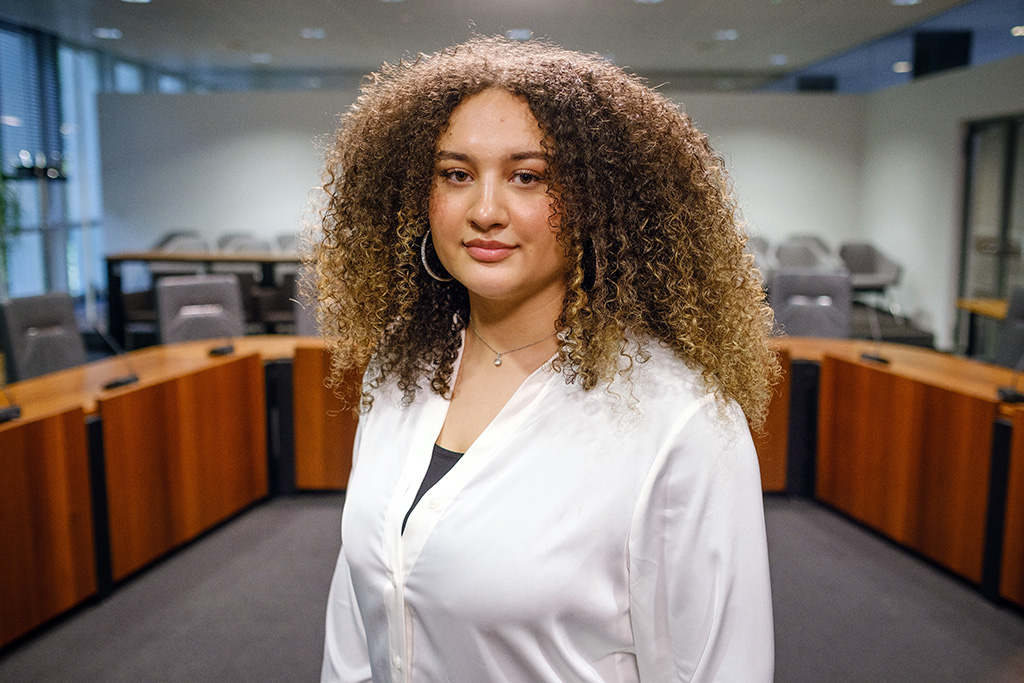Lilly Schurman: ‘The university should really be there for students’
Nightmares, daydreams and unfulfilled wishes: in the column ’13 questions to’ students and scientists show themselves from a different side. This time: Lilly Schurman, she has been appointed as the first student assessor to advise the Executive Board on policy matters.

1. What do you daydream about?
“I then think of a beautiful island where I can swim, and sit with a cocktail in my hand. I’m very busy, and I could use a vacation like that.”
2. What are you lying awake because of?
“Systemic inequality. How people are treated, on the job market, in social situations, at school, on the street. More attention is being paid to it these days and that is very good. But there is still a long way to go. People who tell about what they are going through need to be listened to more. When I give advice, I don’t just listen to what the largest group says, but also to what the minorities say. But I don’t really lie awake very often, I sleep pretty fast.”
3. What book would you recommend to anyone?
“There are a few actually. Maybe a bit of a cliché, but I think of The 48 Laws of Power by Robert Greene. It’s a very well-known book that gives a lot of insights about how people interact. Historical insights, how people came to power and how people in power survive. In the U.S., the book is banned in many prisons because they are afraid that inmates will learn from it how to manipulate jailers.”
4. What do few people know about you?
“That I played the violin. And that I DJ. No, I don’t stand at parties with that. It’s more of a hobby of mine. I don’t actually play the violin now, but I would like to get back into it.”
5. What series do you watch to relax?
“Prison Break. That remains a great series. I’ve watched that one about seven times already and I’m not going to promise I won’t watch it again. The storyline is very strong and a lot of attention is paid to detail. When I watched it for the second or third time, I saw details that I hadn’t noticed at all before. But besides that, it’s just very entertaining.”
6. Who is your great role model and why?
“I find that question very difficult. I don’t really idolize people. I do have a lot of respect for Sylvana Simons. She is the first black group leader in the House of Representatives. She opens a lot of doors for people of color to become active in politics in the future.”
7. What gives you a short fuse?
“When I feel like I’m not being taken seriously. Or if I’m explaining something and notice that I’m not being listened to.”
8. What really needs to be different about the university?
“I feel that students could be listened to a lot more at the university. The university should really be there for the students. I hope to make my contribution to that this year.”
9. What should you actually do more of?
“I’ve started walking in the woods and reading books again for a while now. I find that makes me calmer, it’s good for my mental health. I should definitely do that more.”
10. What is your favorite place on campus?
“The second floor of the library, the quiet section. I sometimes have trouble really concentrating and then it’s wonderful not to be bothered by chatter around you.”
11. What are your plans for after college?
“That’s a tricky one. I want a lot of things. I find politics interesting, but the legal side also fascinates me a lot. A doctorate I might also really enjoy. It all remains to be seen how I will proceed.”
12. Netflix or reading?
“I really enjoy both. But when it comes to really relaxing, I still choose Netflix. For my studies I already read a lot, after that it’s more fun to just put your mind at zero for a while.”
13. Online or offline?
“When it comes to lectures: online. I think the world is definitely going there. Of course it’s important to take regular breaks and go offline for a while, but basically I prefer everything online. I really liked that so much was online in recent years. Not because I “don’t have to go there then,” but to be able to look back. Or if you can’t concentrate for a moment, that you can put it on pause and then continue.”
Translated by Language Center, Riet Bettonviel






